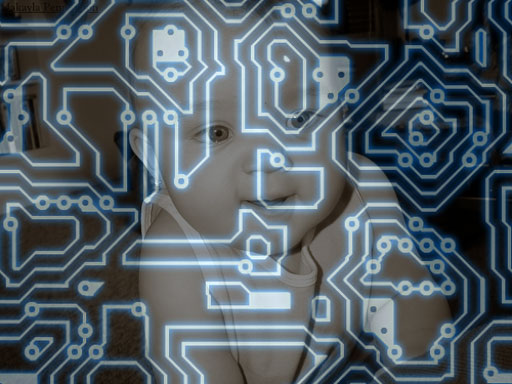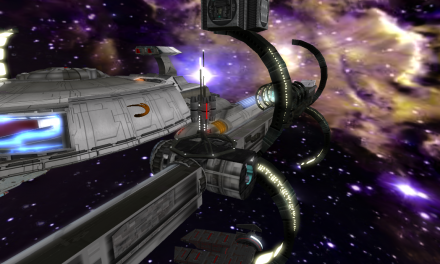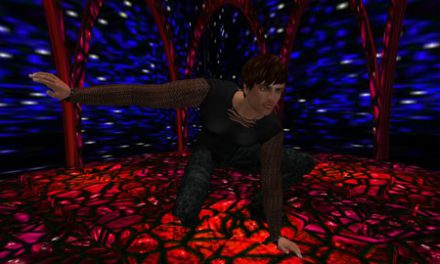By John Riebow
The house was quiet, peaceful now that their child had ceased cooing and crying and crawling along the carpet, slumbering amid quilted sheets and the watchful eye of a stuffed brown bear, the parents free to take their own meal and reacquaint themselves with one another after a long stressful day that consisted of commutes, congestion, consumption and consumerism. On a typical summer night such as this, she might go for a relaxing soak in the pool, while her husband watched a baseball game on the surround-vision system they had installed in the family room last Christmas, but on this particular night the young parents lingered at the dining room table, huddling over a screen, scrolling through pages of information that could forever shape the future of their little family.
“What’s the matter Mae, don’t you want Karl to have every advantage, to be able to be just as good as any other kid out there?” her husband pleaded expressively with his hands. Mae wasn’t sure if this tendency came from his mother or father, but found the practice somewhat disconcerting.
“Of course I do, Cal,” she insisted, pushing a patch of long brown hair out of her eyes. “I’m just not sure this is a good decision. You and I worked hard, studied, got good grades. I feel like we earned our careers, built our brains up, gained knowledge from our failures. This just seems like a shortcut.”
The hands were again in motion before the words came. “It’s not a shortcut; it’s an advance, an advantage, a great leap forward. Like the pc, the cell phone and the Ethernet, this is the next logical step. The Chinese have been implanting nans since 24.”
“That long?” Mae sighed. Things were unfolding so fast, evolving as technological advances leapfrogged one another, an estimated billion-fold since the advent of portable cell phone some forty years prior. Now that everything was beamed over the omnipresent net, she had seen so many things change in her own lifetime: the demise of the post office and bookstore, the rise of virtual reality as a form of social interaction and entertainment, and the latest concept of melding man with machine, not merely in terms of implants and artificial limbs, but on the microscopic level. Tiny super computers were being injected into the bloodstream, such that the basic building blocks of humanity could be altered.
“Yeah, almost five years now,” he affirmed. “Kids need these nans just to be able to keep up.”
“So we are being told,” the wife protested, leaning in the chair, wondering if it was her back or the wood that creaked. It had been a long exhausting day at her accounting firm and she was not sure she was up for this conversation. “But what if the government is wrong, like they are about most things, and we are about to dismantle the very thing that makes us unique? Nans. It sounds so innocuous. Like nanny. Be a good lad and take your nans,” she mocked with a faux-British accent.
Mae knew her concern was valid. There was a rather large segment of the population that had been diametrically opposed to the notion of joining man and machine for decades. They were a seemingly constant presence on the newswire; they ran websites, organized protest marches around the world, and in some instances, incited riots and destruction. The group, who called themselves Neo Luddites after General Ned Ludd, the mysterious 19th century British figure who lead the charge against mechanization during the Industrial Revolution, prophesized a day when the machine would surpass the abilities of the human component and the living element of the coupling would no longer be required, thus effectively causing the extinction of the human race. “From single-celled organism, to pseudo-ape, and extinct in under one hundred thousand years!” they warned, painting a distinctly dystopian future for the world.
“You didn’t make such a fuss about the tracking chip.”
After a seven-year impassioned debate that went all the way to the Supreme Court, it had been decreed mandatory since 2018 that all individuals cited with criminal offence or serving sentence for a conviction had to be fitted with data chip inserted into the forearm. All children born on American soil need the insert within three hours of their birth. The chip was used for identification and tracking purposes, and the courts were now becoming full with cases involving the myriad implications of law enforcement use of the devices. As a result, the ACLU had doubled their legal staff.
“That was normal, safe,” Mae retorted, rubbing her forehead reflectively, “a precaution to protect our child. It didn’t change him. This procedure is so new, so uncharted, so risky. We can’t possibly understand all the implications of having tiny computers injected into the bloodstream.”
“Do you think less of me because I have an actualization chip?” he wondered.
Cal had had the electrode installed in his neck two years prior to meeting Mae during a rock climbing expedition in New Mexico. The component allowed him to interface with his computer and gaming systems by thought impulses, as well as having some limited data storage capacity, and made for an even more intense experience. Mae thought it was a little quirky at first but had certainly known more obsessive gamers, so she was not put off by Cal’s ability to command his electronic devices at will. The new version of the chip had a direct connection to the cerebral cortex, which allowed for super realistic virtual reality interaction, but Cal knew there was no way his wife would allow him to splurge on such an extravagance now that they had a young son to look after. Nan interfaces were covered under their insurance policy; actualization chips for leisure software were another matter.
“Of course not. That’s totally different. You were a grown man when that was installed. You made the decision yourself. We’re talking about a one year-old here, a child. He’s trusting us to do the right thing by him. Can’t we wait till he’s a little older?”
“Karl needs this, now. We’d be remiss as parents if we didn’t give him every advantage as soon as it was available. How’s he going to compete in a world of eight billion, if all the other kids have nans and can think twice as fast and remember ten times as much?”
She tried to tell herself that it was no different than the performance enhancing drugs most athletes took these days. The chemicals enhanced the capacities of muscle, while the nans would compound the function of the entire human body. “It sounds so amazing. The capabilities are staggering, I agree, but is it the right thing to do? We’re the parents. We are supposed to nurture and teach. What happens when the child surpasses our abilities? How are we going to relate?”
“The offspring always supersede the progenitor; that’s how our species has evolved. You can’t expect Karl not to be better than us; that’s what’s supposed to happen. We shouldn’t be afraid to create a super man.”
“I don’t want a super man, Cal. I just want a little boy.”
Before the birth of her son, Mae did not know what sort of mother she might be. She wanted to be more attentive than her own, a woman who saw more value in her career as a fashion designer than a mother of four, but not overbearing either. Was there such a thing as the perfect balance? She did not realize until she took little Karl in her hands, a tiny helpless squirming bundle needing to be fed, sheltered, and loved, felt his warm breath or her neck, that she would give her own life for the child. She hadn’t realized until then, but it had been her destiny to bring little Karl into the world. Now the world wanted to change the gift she bore and it was a struggle she had been having with herself ever since Cal mentioned the nans weeks ago. “I thought there would be time to consider the decision, it’s here way too fast!”
The husband rolled his long fingers over the screen, recalling more documents to support his case. He thought Mae was just as eager as he was to give their offspring this opportunity and found his wife’s sudden resistance somewhat surprising. “He’s going to have to have nans to get into the education system. It’s implied now, but there will be laws soon, just like kids having to be immunized. They’ll have to have their shot of nans before long.”
“We could always send him to another school, a private one,” she considered aloud.
“You mean one of those religious places?” Cal groaned, nose upturned.
“Please don’t make that face again, it really doesn’t become you.”
“What face?” Cal wondered, aping the look in the screen’s reflection.
“You know what I’m talking about!”
“I can’t believe we are fighting over this.”
“We are not fighting, we are discussing.”
“To be honest, it’s still hard to believe I’m a father and that I have a son, the product of this,” he pointed to his lap with a wry smile. “It’s all come up on me pretty fast too, Mae, but now that Karl is real, I want him to be the best he could be. That’s all I’m trying to do. Are we are talking about a scripture school? Really?”
“Not necessarily. Maybe some place that takes things just a little slower. Everything is moving so damned fast. We’re not sure how any of this might affect him. The nans will alter his DNA, change the way his genes function and interact. Are we ready for that? Is he? I don’t know, Cal. I’m not fully sold on progressive humanism.”
After the months they spent outdoors, climbing, hiking and biking as they got to know one another, Mae never could have imagined that Cal would be so intent on subjecting their son to the latest technological craze. She saw him as more of a naturalist, apt to let things run their course, but the past few years had changed him. His career as construction manager was not going as well as he had hoped, and the pressures of being a father seemed to be weighing on him heavier than she would have predicted. Maybe it was from lack of sleep when Karl woke them in the night, but she certainly noticed her husband had grown quick to anger, and there were times when Cal was so morose that he hardly uttered a word for hours. If Mae had to guess, she’d say Cal was becoming more like his father than she, and probably he, would care to admit.
“This is larger than you or me, or our little son,” Cal said forcefully, pointing to his wife, himself, and the sleeping child in the adjacent room. “This country has some big decisions to make next November. We need a President who is going to take this nation into the bold future, not wallow in the shadows of the past, and we, as loyal Americans, need to be strong enough to commit ourselves to the taking the lead. I don’t know about you, but I’m tired of seeing the Chinks calling all the shots. The last decade has been an embarrassment. What would our great grandfathers think if they knew the Commies had won in the end?”
“Let’s forget about the world stage for a minute, and talk about what’s going on right here in Cook County, Pennsylvania,” Mae insisted, leaning forward to make the time-out signal she had seen in sporting events. “I’m scared, Cal. I’m scared for you. For me. For Karl. Lots of other families are having this same discussion, right now, around tables all over this land, and many are saying that we need to slow down. I’ve read the blogs. The hate is almost palpable. One side sees progress and the other absolute doom. To me, this country seems closer to civil war than ever.”
“That’s because there are people who would rather believe in some invisible all-powerful super being than trusting hard scientific fact. The hard work has been done. Gates, Jobs and Kurzweil. If it weren’t for those guys, great Americans one and all, and what they did sixty, seventy years ago, where would we be now? What would our society be like? The human race is on the verge of true greatness, and I want my son to have his chance to shine.”
“There is no turning back once the nans are injected. They become one with the person and can’t be turned off.” She knew Cal understood this; she just wanted it to be known that she understood as well. “To be honest, I keep asking myself if I could live with something that was part machine. It might look like our son and talk like our son, but it wouldn’t be the life we created.”
“Of course it would! He will always be ours. I don’t want to tear him down, I want to build him up.”
“What if those things burrow into the marrow of what Karl is and somehow turn off the gene for love? What if he was no longer capable of feeling? Could I live with a child who had no love for his mother?”
“That won’t happen.”
“You can’t be sure of that. You cannot state that as scientific fact. You hope it won’t happen, just like anyone undergoing a medical procedure hopes the operation will be a success; that there won’t be unforeseen complications, but you cannot guarantee the end result. Science gives no guarantees.”
Mae activated the camera in their son’s room by passing a finger over the screen and the couple looked down on the image of their slumbering child.
“He’s so tiny,” she whispered.
“A sleeping giant, Mae,” Cal said, squeezing her hand. “A sleeping giant.”
“What if they did it to me first?” she wondered aloud. “What if I took the nans? Would that make me understand any better? Would that make the decision any easier? Who knows, maybe if we both had the injection then I might connect with Karl on a whole new level. It could be like we were in the womb together.”
“Would you really do that?”
“I honestly don’t know. I imagine it would be like a game hunter facing down a charging rhino. I’d be scared as hell but would probably pull the trigger.”
Carl whistled. “Damn, sometimes you get real deep, girl.”
“These are not shallow waters, kid,” she said, kissing him on the forehead.
“Then let’s wade to the shore, stick our toes in the sand and sleep on this a little.”
A wave of relief doused her. “Thank you. You know, all this talk of biology has done something funny to me,” Mae said, running hands slowly up her thighs. “What do you say you run that beach program on the surround-vision and we get a little exercise before bed.”
“That’s why I love you.” Cal laughed as he leapt over the table and made for the family room at breakneck speed.
John Riebow was born and raised in Philadelphia. He holds a Bachelor of Science degree in Landscape Architecture from Temple University, is a LEED-Accredited Professional, and serves as Director of Design for a design-build-development general contractor. His work has been placed in Abandoned Towers, Audience, Ensorcelled, Forge Journal, Loch Raven Review, Mulberry Fork Review, Ninth Aspect and Roboterotica.




